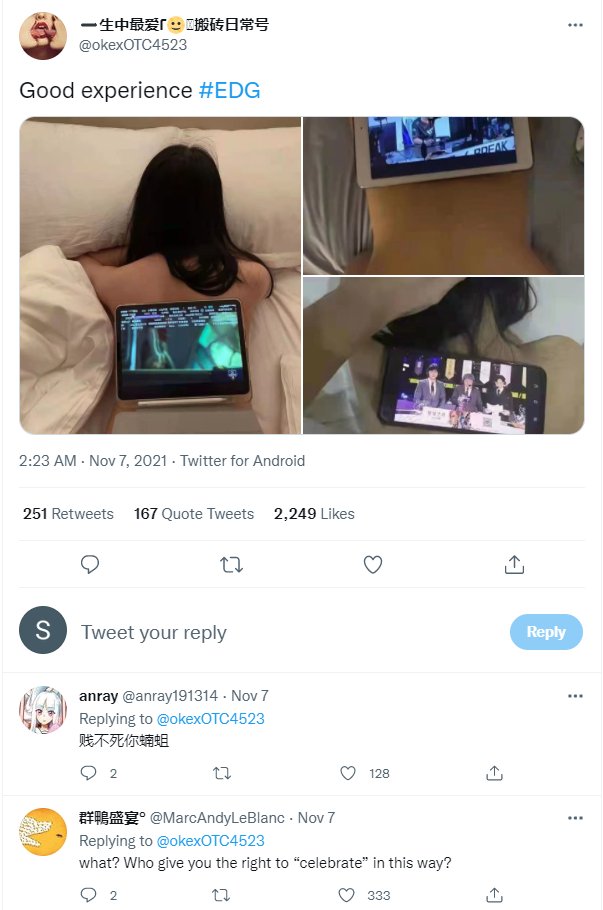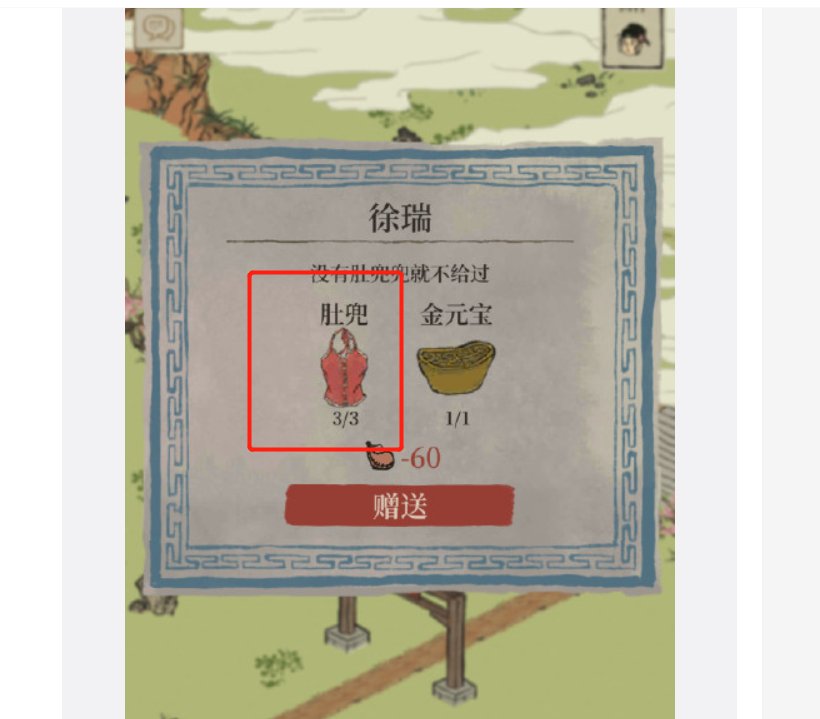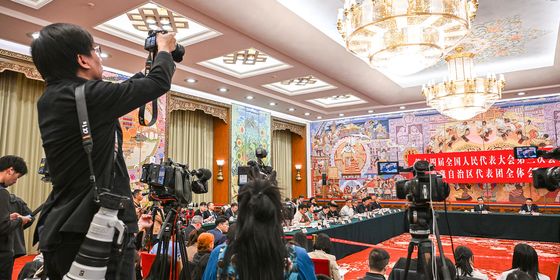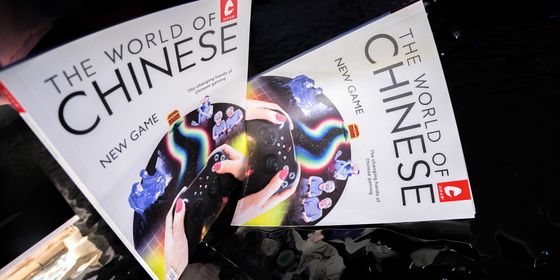Chinese esports team’s victory triggers rape threats and sexual harassment from male fans
It started well: In the early morning of November 7, news of China’s Edward Gaming (EDG) team winning its first League of Legends world championship title flew in from Reykjavik, Iceland. Previously considered an underdog against Team DK from Korea, defending champions of the competition, EDG launched Chinese gaming enthusiasts into a frenzy with its surprise victory.
The Weibo hashtag “EDG wins championship (#EDG夺冠#)” has received over 3 billion reads and 4 million discussion entries at the time of writing, while offline, all around the country, fans shook university dorm buildings with uncontained hollers, or took their excitement to the street by galloping around wearing EDG’s signature black flag—or nothing at all. Others made good on “challenges” they promised to take on in the event of an EDG victory, with videos showing youngsters washing their hair in a handstand, shaving their heads, or even drinking from the toilet.
The fanfare took a disturbing turn, however, when a viral video on Douyin (China’s version of TikTok) showed dozens of male students in a university in Nanchang, Jiangxi province, flocking to the room of their dorm caretaker in the middle of the night so that one of their classmates could fulfill his promise of “proposing to the dorm auntie” if EDG won. The video showed the middle-aged woman keeping her door closed and holding her curtains shut, while the boys cheered and jeered outside.
Some made threats of rape and violence against women if EDG won, while other unsettling content showed women’s bodies being subjected to “challenges” also surfaced. Around noon on November 6, Twitter user @a75930906 tweeted, “#ifEDGwins, I will post a photo of my girlfriend getting fucked.” According to a critical essay by the feminist WeChat platform “Girls Don’t Be Afraid (女孩别怕),” the user followed through by posting a high-definition explicit photo, which had subsequently been deleted.
Other humiliating posts, unfortunately, remain.
Some commenters on Twitter seemed to take these posts as jokes. However, Girls Don’t Be Afraid’s article points out, “Even though posting ‘hitting my wife if they win’ could just be a joke, it is enough to arouse fear in all women, because things like that have happened way too many times.” As the article notes, sex is used as a means to demonstrate power for men who feel they share a piece of the gamers’ victory, and use women as mere tools to serve their celebration.
These screenshots, though, may be the tip of a toxic iceberg in the gaming world, which seasoned players say is rife with casual misogyny and discrimination, as well as harassment of female gamers. “I’m sorry. I really can’t control my temper when I talk about this,” Huihui, a gaming enthusiast who asked to be identified by a nickname, apologizes as she talks to TWOC over WeChat.
Huihui says the reactions to EDG’s win triggered many unpleasant memories of her experiences in the male-dominant gamer community. To demonstrate, she sends over screenshots from livestream platforms Huya (虎牙) and Douyu (斗鱼), which invite gamers—mostly male according to Huihui—to play and discuss games live, meanwhile inviting “sexy girls” on stage, who bend over, show off their curvy features, and make other sexually suggestive poses for the camera.
Lewd content is even incorporated into the design of games. Huihui cites a mobile game she used to play called One Hundred Scenes of Jiangnan (《江南百景图》), a roleplaying adventure released in 2020 in which players build a city in the Ming dynasty. In one challenge on the game, players had to collect three pieces of dudou (肚兜), a traditional Chinese undergarment for women, to bribe the guards to let them pass.
“I spent quite some money on this game, but it’s really dumb...so I eventually uninstalled it,” says Huihui. “[People in this industry] think female gamers don’t exist...I think misogyny is everywhere here. It’s magnified in the gaming world because the games now are almost all about pleasing men.”
Female gamers do exist, and are on the rise in China, but they are still few and far between compared to their male counterparts. In an April 2021 survey published by market research and consulting firm iResearch, only 31.7 percent of China’s esport players are female.
Female players also face more obstacles to reach the top in esports. Chinese gamer Li Xiaomeng, the first female gamer ever to win the Hearthstone Grandmasters Global Finals, recalls a man’s skepticism when she first signed up for a tournament two years ago, “Girls can compete too?”
During a 2020 interview with TWOC, Li reflected on the incident: “I think that female players are looked down on because women are considered bad players...There are many stereotypes in China that women can’t do well in certain professions—esports is just one of many. One of the biggest challenges I face based on my gender is that people in China just comment on my appearance and my figure, rather than my ability to play Hearthstone.”
Sexism exists not only in the players’ community, but also the game industry. Through a 2020 article published by Sixth Tone, a senior game designer at a Chinese tech company, writing under the pseudonym Silvara, recounts, “[Justifying disrespecting women’s feelings and requests based on profit] is made easier by the fact that the majority of game developers in China are men...When I entered the industry a few years ago, I was the only woman out of 20 people in my onboarding group. My boss flatly told us—me—that ‘new hires could be terminated if they get pregnant immediately after joining the company.’”
These experiences are not unique to China. A 2021 study by Reach3 Insights and Lenovo found that, based on conversations with 900 women in the US, China, and Germany, 77 percent of female gamers have experienced gender-specific discrimination including judgments of skills (70 percent), gatekeeping (65 percent), and patronizing comments (50 percent). Meanwhile, “59 percent of women surveyed use either a non-gendered or male identity when playing games online to avoid conflict.”
Silvara believes that to truly raise the status of female gamers and reduce sexism in gaming will require improving the status of women in Chinese society in general, but the industry can also bring more women into decisionmaking roles and “respect and consider female perspectives before making design choices.” Li, on the other hand, has said, in front of screaming fans when she had just won the Hearthstone tournament in California, “as long as people become more kind to women in esports and show more respect, more tolerance, I think there will be more women coming into esports to compete and have the same achievement as men do.”
Meanwhile, Girls Don’t Be Afraid suggests esports fans reflect on their modes of celebrating. The article applauds, instead, one fan who donated 4,000 RMB to charity and another who pledged to finish and submit their academic paper in honor of the win: “There isn’t a standard for celebrating, but at least it should not be a motivation for crime or a reason to bring harm to someone else.”
Additional reporting by Alex Colville

















